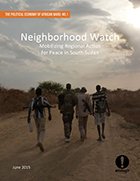
A new report released today, Neighborhood Watch: Mobilizing Regional Action for Peace in South Sudan, describes the competing political and economic interests of South Sudan’s neighbors that have so far undermined regional willingness to take action against the warring parties, including imposing targeted sanctions and an arms embargo.
The warring parties have little interest in making compromises for peace when there is no cost for not doing so. Neither the region nor the international community have held South Sudan’s leaders to commitments made at the negotiating table, including nine signed agreements to cease hostilities, all of which have been violated within days. Continued inaction by the region and international community has reinforced a culture of impunity as the conflict on the ground has intensified. In order to bring the conflict to an end, the United States and other key international partners must take steps to ensure that regional interests and strategies are aligned with multilateral efforts to increase pressure on the warring parties.
“South Sudan’s peace process is playing out like a deadly poker game among regional elites where the stakes keep getting raised, but nobody has a particularly good hand. Regional players like Uganda and Sudan have placed bets on the conflict, providing support for either the government or opposition forces, in order to maintain their access to South Sudan’s natural resource wealth. Unless the U.S. and other key international partners step up both diplomatic efforts and economic pressure, neither of the warring sides are likely to fold anytime soon.”
-Justine Fleischner, Sudan and South Sudan Policy Analyst
On December 15, 2013, tensions between factions loyal to President Salva Kiir, of the Dinka ethnic group, and those aligned with his former Vice President, Riek Machar, of the Nuer ethnic group, exploded into fighting on the streets of the capital city Juba. South Sudan’s dramatic return to war has torn communities apart, left countless thousands dead, and over two million displaced. Since the regionally led peace process broke down in March 2015, fighting on the ground has intensified, including targeted ethnic killings, rape, the recruitment of child soldiers, and other war crimes, as documented by Amnesty International and Human Rights Watch.
Neighborhood Watch: Mobilizing Regional Action for Peace in South Sudan, following extensive research in the region and dozens of interviews, outlines how economic pressure could fundamentally alter the calculations of the warring parties. In order to build regional support for targeted sanctions, the Enough Project recommends that the United States and other key international partners focus on cutting off the money flows that fuel the conflict, building political will and technical capacity for regional sanctions enforcement, and working with regional players to build economic and political incentives for peace.
The report recommendations include:
Enforce regional sanctions; create regional incentives
- The United States should lead a diplomatic effort to build regional support for targeted sanctions enforcement, and deploy other possible financial pressure tools.
- The United States should work with China and with regional governments to align the region’s economic development agenda with an end to the conflict in South Sudan.
- The U.N. Security Council should adopt a global arms embargo to limit the flow of weapons and ammunition to the warring parties.
Build capacity for ongoing sanctions enforcement
- The United States should increase its own intelligence gathering in support of targeted sanctions.
- The United States, European Union, and other donors should expand their existing capacity-building efforts in the region to strengthen Kenya, Uganda and Ethiopia’s capacity to enforce sanctions imposed by the U.N. Security Council.
- International donors should prioritize funding to civil society organizations in South Sudan, Uganda, Kenya, Sudan, and Ethiopia that are dedicated to combating impunity for economic crimes, pursuing transparency agendas, and urging regional sanctions enforcement.
End the regional political tensions driving conflict
- International partners engaged in the peace process should ensure that regional tensions, such as the long-standing dispute between Uganda and Sudan, and support to the warring parties do not continue to extend the conflict.
Editor’s Note: “Neighborhood Watch: Mobilizing Regional Action for Peace in South Sudan” is the first in the Enough Project’s new series of in-depth, field research-driven reports on the dynamics of profit and power fueling war in the Horn, East and Central Africa. Violent kleptocracies dominate the political landscape of this region, leading to protracted conflicts marked by the commission of mass atrocities by state and non-state actors. Enough’s Political Economy of African Wars series will focus on the key players in these conflicts, their motivations, how they benefit from the evolving war economies, and what policies might be most effective in changing the calculations of those orchestrating the violence–including both incentives and pressures for peace.

